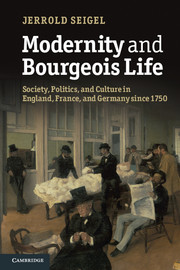 Modernity and Bourgeois Life
Modernity and Bourgeois Life Book contents
- Frontmatter
- Contents
- Illustrations
- Preface
- 1 Introduction: ends and means
- Part I Contours of modernity
- 3 Monarchical centralization, privilege, and conflict: France
- 4 Localism, state-building, and bürgerliche Gesellschaft: Germany
- 5 Modern industry, class, and party politics in nineteenth-century England
- 6 France and bourgeois France: from teleocracy to autonomy
- 7 One special path: modern industry, politics, and bourgeois life in Germany
- Part II Calculations and lifeworlds
- 8 Time, money, capital
- 9 Men and women
- 10 Bourgeois morals: from Victorianism to modern sexuality
- 11 Jews as bourgeois and network people
- Part III A culture of means
- 13 Bourgeois and others
- 14 Bourgeois life and the avant-garde
- 15 Conclusion
- Notes
- Index
8 - Time, money, capital
Published online by Cambridge University Press: 05 June 2012
- Frontmatter
- Contents
- Illustrations
- Preface
- 1 Introduction: ends and means
- Part I Contours of modernity
- 3 Monarchical centralization, privilege, and conflict: France
- 4 Localism, state-building, and bürgerliche Gesellschaft: Germany
- 5 Modern industry, class, and party politics in nineteenth-century England
- 6 France and bourgeois France: from teleocracy to autonomy
- 7 One special path: modern industry, politics, and bourgeois life in Germany
- Part II Calculations and lifeworlds
- 8 Time, money, capital
- 9 Men and women
- 10 Bourgeois morals: from Victorianism to modern sexuality
- 11 Jews as bourgeois and network people
- Part III A culture of means
- 13 Bourgeois and others
- 14 Bourgeois life and the avant-garde
- 15 Conclusion
- Notes
- Index
Summary
Time and money form a dyad often invoked in connection with both bourgeois life and modernity. To be sure, neither belongs exclusively to any social formation or historical moment, taking on different forms and playing different roles in particular periods and places. We will see in this chapter that ways of measuring time and the forms taken on by money both developed in tandem with other topics being considered there, taking a marked and significant turn after the middle of the nineteenth century as a consequence of the deepening impact of distant relations in practically every realm of life. In order to make the importance of this turning still clearer the current chapter looks at parallels between money’s history and that of banking and finance, and concludes by considering the historical trajectory that has been attributed to one particular form of money, the one Marx sought to analyze in Capital.
Widening webs and the ordering of time
Whether it merits being called “natural” or not, the way of measuring time in Europe before the later Middle Ages (and in most other parts of the world) was less abstract than the one we know today, since it allowed the length of hours to fluctuate in accord with the longer or shorter period of daylight between sunrise and sunset. On sundials, for instance, each hour represented a given proportion of the total (a tenth or twelfth in most cases) regardless of the season. By contrast, modern “clock time” establishes days and hours of constant length, all divided into standard minutes and seconds, maintaining these regularities regardless of variations in daylight. Until fairly recently a number of historians attributed the turn to the more modern way of reckoning hours to merchants, concerned to use their own time and that of their employees in a disciplined and efficient way, in contrast to rural people whose lives were regulated by seasonal changes, and the Church, whose schedule of prayers and rituals made reference to the rhythms of the solar day. But closer attention, notably by the German historian Gerhard Dohrn-van Rossum, has revealed a different pattern.
- Type
- Chapter
- Information
- Modernity and Bourgeois LifeSociety, Politics, and Culture in England, France and Germany since 1750, pp. 267 - 304Publisher: Cambridge University PressPrint publication year: 2012


